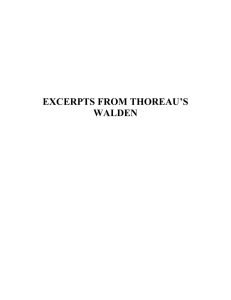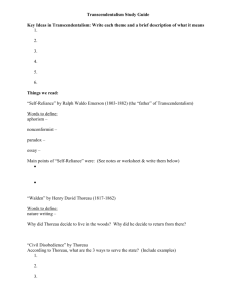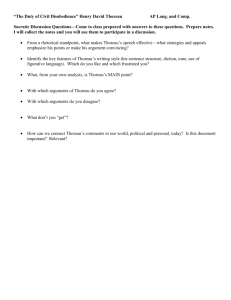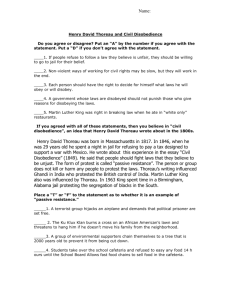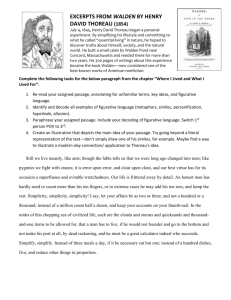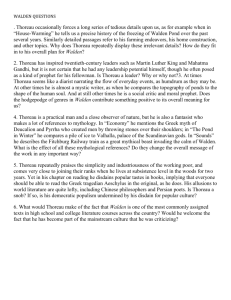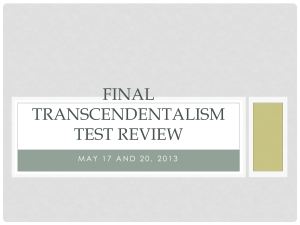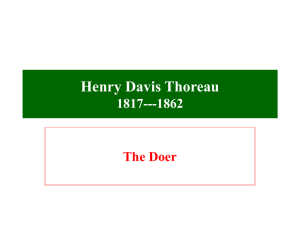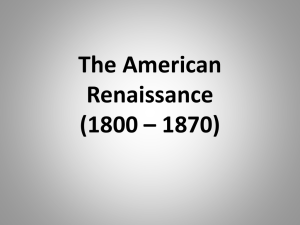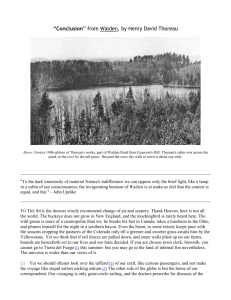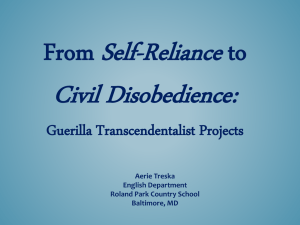PPT - Marc D. Baldwin, PhD
advertisement
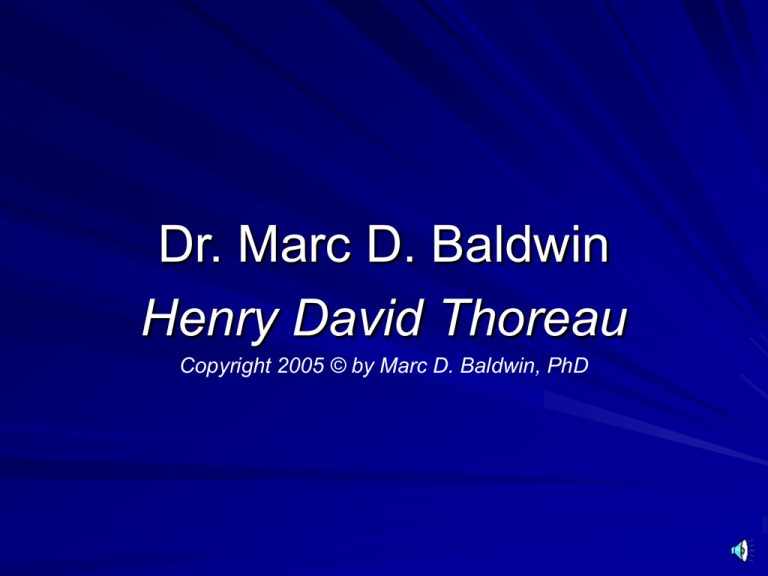
Dr. Marc D. Baldwin Henry David Thoreau Copyright 2005 © by Marc D. Baldwin, PhD Emerson’s Friend Much of what I talked about in the RWE, Romanticism, and Transcendentalism Lectures applies to Thoreau as well, so please consider those remarks applicable here. In fact, Emerson was Thoreau’s mentor, of sorts, until the student surpassed the teacher in one sense at least: Emerson talked about how to live differently while Thoreau went out and did it by living a Spartan existence in the woods for two years, an experience he chronicled in his masterpiece Walden. He was, thus, more of a practitioner than a philosopher, believing that America’s promise was as yet unrealized. Walden T went to live near Walden’s Pond as an action based on principle so that he could get closer to Nature. The book is full of correspondences, meant to instruct the reader in how to live a more meaningful life. Very Romantic, the lessons of Walden are solipsistic, teaching that we must perceive everything as a reaction to our own personal responses. It’s also narcissistic in that Thoreau sits meditating for long periods of time on the banks of the pond, contemplating his mantra, concluding that human activity is futile without the transcendant spirit and transparent eyeball of the Over-soul. 3 movements of Walden The book is structured in 3 distinct ways: 1) Chronologically, as a diary or journal of T’s two years there. 2) Rhetorically, as an argument for adopting his philosophy and lifestyle; and 3) Mythically, as a quest for a rebirth into a more enlightened state of mind and being. Innocent Eye T looked at the world with an innocent eye, attempting to “see without looking." Striving to "recover the lost child that I am," T sought to cultivate a child-like mind, believing that on each morning one should start anew his quest for Truth. The movie Groundhog Day is an exercise in Thoreau’s transcendental revisionism. As T puts it, "It is only when we forget all our learning that we begin to know." The "highest wisdom does not inspect, but behold." This frame of mind is perfectly illustrated by Walt Whitman in his superb little poem, “To a Learn'd Astronomer." Romantic Cultivation of the Self Like any good Romanticist, T believed in pursuing his own path on the journey to discover his own divinity. For T, God is within your soul and in Nature. The grand irony is that the more we seek ourselves and our individuality, the more we come to believe in the collective unconsciousness of humanity. As T said, "If I seem to boast more than is becoming, my excuse is that I brag for humanity rather than for myself." This statement echoes Walt Whitman, who as I’m suggesting, was greatly influenced by Emerson, Thoreau, and transcendental thought. Simplicity Perhaps the essence of T’s philosophy is the notion that we should live more simple lives. "Our life is frittered away by detail... Simplify, simplify,” he urged. Men, he believed, have "become tools of their tools.In proportion as he simplifies his life, the laws of the universe will appear less complex, and solitude will not be solitude, nor poverty poverty, nor weakness weakness." Thoroughly Modern Henry A strong case could be made for Thoreau’s enormous influence on the era of Modernism, which was coming along toward the end of the 19th century. T believed in simply stating the facts for "Reality is fabulous." Like Whitman and the Modernists, T wrote paratactically, eschewing formal structure and setting down impressions in random order. His writings were "excursions." And also like Whitman and the Modernists, he preferred writing in the 1st person singular to capture the immediacy of the experiencing ego, the seeing individual eye. “Civil Disobedience” One of the most influential pieces of writing in world history, T wrote “CD” to chronicle his protest of three things: the Mexican War, slavery and taxes. He refused to pay taxes in protest of the Mexican War and slavery. As a result, he was put in jail for a night or two. It didn’t bother him a bit. In fact, he concluded and insisted that it is a man’s “duty” to break the law he disagrees with, but to do so in a non-violent manner. This principle of non-violent civil disobedience was embraced by two of the 20th century’s most powerful figures: Mahatma Ghandi and Martin Luther King Jr., who led the Indian people and the American Blacks respectively in their quest for civil rights and true freedom from oppression. Both Ghandi and King cited Thoreau as one of their main inspirations in life. Is Thoreau Relevant? A somewhat sad and perplexing question is whether or not Thoreau’s brand of reclusive protest is practical or even relevant for us today. Not many of us can afford to go to jail for our principles. It just doesn’t look good on a job resume. Nor can we take two years off to live in a cabin in the woods communing with the raccoons and possum. And it’s easy to say “Simplify, Simplify,” but in today’s world those who cannot multi-task and who aren’t able to manipulate a multitude of duties and skills sets find themselves on the unemployment line. It would be nice to chuck it all and grab a fishing pole, but bills and responsibilities don’t allow such a luxurious permanent vacation. So Thoreau’s theories are great to help us balance things out, though they are likely impossible to completely adopt.
